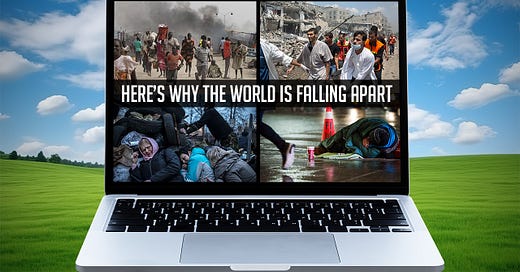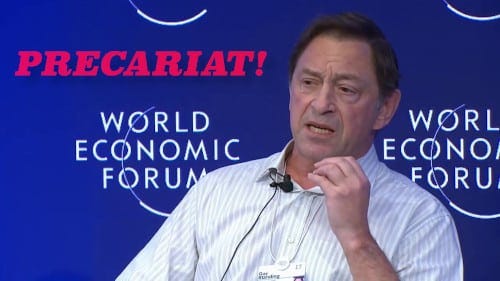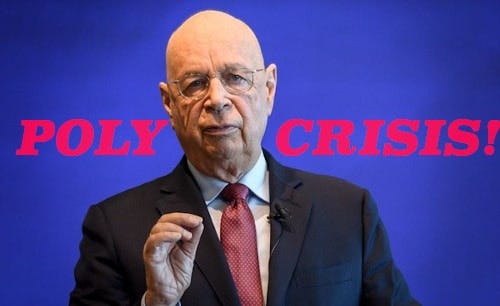by James Corbett
corbettreport.com
June 23, 2024
Do you ever get the feeling that everything is breaking down all at once?
Forget about starting a family or buying a house. It's becoming harder and harder for young men and women just to put food on the table.
And those lucky ones who defy the odds and manage to start a family sure aren't spending their time at neighbourhood barbecues while the kids play a game of pick-up street hockey. Today, they'd be lucky to pry the kids away from their device long enough for them to notice that there are other kids in their neighbourhood. Not that the parents are any better at living life.
What's everyone doing on those devices? Scrolling through their never-ending social media feeds of doom porn and ragebait, of course! They're busy watching Israel holocaust Palestine and NATO inch closer to nuclear war with Russia and people at home engaging in public freakouts as society disintegrates and the world devolves into madness.
That faith in the ability of hard work and determination to help us all improve the planet and leave a better place for our children? Gone. Replaced by a sinking feeling that the world is heading to hell in a handbasket and that maybe it isn't worth saving anyway.
Yes, from the macrocosm of geopolitical crises and financial trickery to the microcosm of economic disintegration and spiritual malaise, it seems like everything that could go wrong is going wrong. Increasingly, it feels like we're just bystanders watching the messy spectacle play out on our screens, digital drivers rubbernecking at the car crash of chaos unfolding on the information superhighway.
But did you know that there's a name for this phenomenon? And that it's part of a years-long plan by the powers-that-shouldn't-be to destabilize the world and move their agenda forward? And did you also know that by merely watching this disaster taking place, we're actually helping that plan along?
No? Well, you're about to learn all about it! Let's dig in.
The Precariat
Back in 2011, Guy Standing—a Marxist economist and a professor of development studies at the University of London—published The Precariat: The New Dangerous Class, in which he defined a new type of social class that has arisen in the labour market of the 21st century:
The precariat was not part of the ‘working class’ or the ‘proletariat.’ The latter terms suggest a society consisting mostly of workers in long-term, stable, fixed-hour jobs with job titles their fathers and mothers would have understood, facing local employers whose names and features they were familiar with.
Many entering the precariat would not know their employer or how many fellow employees they had or were likely to have in the future. They were also not ‘middle class,' as they did not have a stable or predictable salary or the status and benefits that middle-class people were supposed to possess.
In other words, in Standing's estimation, the "gig economy" of recent years has created an entirely new class of workers whose very economic existence is defined by its precarious nature.
Coming from a Marxist worldview, this concept of "the precariat" portrays these workers as just another unindividuated mass of laborers in the Great Class Struggle and insists that they are the helpless victims of vast economic forces beyond their control. It insists that these masses of asses' only hope is to lobby governments to give gig workers more rights . . . or to overthrow the government and institute a dictatorship of the precariat . . . or whatever it is that Marxist economists believe.
Naturally, this worldview appeals to the greatest collectivists of them all: the globalists. It's no surprise, then, that within a few short years Standing was being invited to speak at Bilderberg 2016 on "Precariat and middle class [sic]," or that his work was then promoted by the World Economic Forum, who invited him to speak at Davos 2017 [sick!].
But that raises the question: why are the arch-globalists at Bilderberg and Davos so interested in promoting this "precariat" idea?
In order to answer that, first we have to look at another term the powers-that-shouldn't-be have attempted to implant in the public consciousness in recent years.
The Polycrisis
The only thing the kakistocrats at the top of the global pathocracy love more than a Marxist economist is a "post-Marxist" French sociologist. That explains why the works of Edgar Morin—a 103-year-old French theorist who has been writing since the 1940s—have been drudged up, dusted off, and pored over by establishment mouthpieces and globalist gophers in recent years. Their treasure hunt has resulted in a valuable find indeed: the word "polycrisis."
Specifically, former European Commission president (and longtime Bilderberg stalwart) Jean-Claude Juncker used a 2016 speech about the European Union's woes to reintroduce the term—first coined by Morin in the 1990s—to modern political discourse:
This European Union has faced its worst economic, financial and social crisis since World War II. And it is still struggling with the consequences. I have often used the Greek word 'polycrisis' to describe the current situation. Our various challenges—from the security threats in our neighbourhood and at home, to the refugee crisis, and to the UK referendum—have not only arrived at the same time. They also feed each other, creating a sense of doubt and uncertainty in the minds of our people.
While that passing remark about "polycrisis" may not seem like much to normal people with their heads screwed on straight, the Machiavellian schemers in the globalist jet set demonstrably do not have their heads screwed on straight.
Accordingly, Juncker's fleeting reference to the term was picked up and elaborated by mainstream historian (and Davos attendee) Adam Tooze in the pages of the City of London's mouthpiece, Financial Times, in 2022. From there, it became the "buzzword" at Davos last year, and the World Economic Forum then conducted a feature interview with Tooze about the term and why it so perfectly describes the world of chaos that the would-be global rulers are bringing to pass.
Citing the Club of Rome's Malthusian propaganda on the Limits to Growth in the 1970s as one of the "first forecasts" of the modern polycrisis, Tooze then positively gushes about how the grand plan for bringing (technocratic) order ab chao is culminating in the total disintegration of the global economy and civil society in the post-COVID world.
As the Club of Rome report and various types of epidemiological expertise was saying at the time, the dawning awareness that the miracle of economic growth, which had really taken off in a dramatic scale after World War Two, has a downside [sic]. So a series of really very dramatic risks are being generated by the very success of our economic growth story—on the resource environmental envelope side, but also on the pandemic disease zoonotic mutation side. Edgar Morin, the French theorist who first coined the term, is a classic 1970s environmental alarmist analyst. So there's a tightness to that chronology.
But it's one thing seeing the shape of something, it's another seeing its reality. And that's where the pandemic experience of 2020, 2021, is just the showstopper because we stop the world economy in its tracks. We've never done anything remotely like that before—a 15-20% hit to global GDP in a matter of weeks.
The polycrisis, in other words, is defined not by any of the individual crises that comprise it—the (phoney) climate crisis or the (phoney) COVID crisis or the (generated) economic crisis, etc.—but by the way all of these crises interact and play off each other. This is why the chaos of recent years seems so overwhelming to all of us watching the disaster unfold in our newsfeed. It's not a series of problems that each admit of individual solutions, but a compounding snowball of problems in which every individual crisis feeds into every other crisis.
Now, here's the real question: why are these presumed potentates of the planet so excited by these ideas of "the precariat" and "the polycrisis"?
Why? Because it's part of their grand plan, of course.
Up Next: The Polycrisis of the Precariat? . . .
It's not hard to understand why the Bilderbergers and their minions in the academy and the establishment media are trying to insert "the precariat" and "polycrisis" into the public consciousness. These terms play into their long-term plan to bring (New World) order out of (generated) chaos perfectly.
Don't take my word for it. Look, for example, at what Bilderberg's favourite Marxist, the aforementioned Guy Standing, argued in his World Economic Forum-hosted screed on the precariat back in 2016. After proposing that governments worldwide collect more money from their tax cattle by way of "a special levy on income generated by patents, copyright and other forms of intellectual property" and a levy "on income taken by digital platform companies from app-driven labour transactions," he then proposes a bold new idea for what the bloodsucking political parasites should do with all that stolen wealth: Universal Basic Enslavement Income, of course!
In sum, a basic income must be part of a new income distribution system. It may take time to build up the funding base. That is why policy-makers must prepare the ground carefully and offer an evolutionary approach, one that gradually dismantles the old welfare system, built in bits and pieces in another era, while constructing a new one suited to our times. The task for the rest of us should be to strengthen the backbones of politicians and the institutions behind them. Basic income is, indeed, a political imperative.
What?! A Marxist economist is proposing that the answer to the great class struggle is to steal money from the people and give some of it back in the form of a monthly, strings-attached stipend? And this "radical" idea is being promoted by the World Economic Forum? Colour me shocked. (<--SARCASM)
What about the polycrisis? Is it a Trojan Horse for the globalist plan, too?
Well, just take a look at what establishment mouthpiece Adam Tooze concludes in his World Economic Forum-hosted screed on the polycrisis. After noting the benefits that polycrisis can bring in helping to strengthen the various arms of the Deep State—he actually delights in how COVID propagandists, for example, can share what they learned about how to manipulate the public with German government agencies seeking to sell the public on the green neofeudal agenda—he then tells us to relax. At least we have a name for the chaos taking place around us!
The purpose, the idea of the concept is simply to open up the threads through which you can begin to see the connections. If you just read a newspaper or watch the news, you are presented with this collage that begins to just look incoherent and crazy to the point where you begin to wonder whether you will actually be able to trust your own senses.
What the polycrisis concept says is, 'Relax, this is actually the condition of our current moment.' I think that's useful, giving the sense a name. It's therapeutic. 'Here is your fear, here is something that fundamentally distresses you. This is what it might be called.'
"Yes!" say the globalists. "You workers are a precariat class and you are part of the Great Dialectic! Now, listen carefully: your salvation lies in Universal Basic Income and other government interventions in the economy that just so happen to give us greater control over your lives!"
And "Yes!" say the globalists. "The world is in polycrisis! Look at your newsfeeds! You know it to be true. Just give us more control and relax in the knowledge that we'll fix it all for you!"
This is how the public has been led along by the nose for generations. Ideas and phrases are inserted into the public discourse—"Making the world safe for democracy" or "Responsibility to Protect" or "the Global War on Terror" or "Social distancing" or a million other carefully packaged slogans—and suddenly the discussion is framed in those terms.
Even those who oppose these ideas can never truly escape them. The ideas can only be argued against from within the framework of the world that they presume—a world where democracy is warring with autocracy or where genocides are preventable by UN action or where global terrorism is a pervasive threat or where social contact is inherently dangerous.
And now that "the precariat" and "polycrisis" have entered the dialectic, the globalists are yet one step closer to achieving their world conquest.
How can we possibly escape this vile plan?
. . . Or the Polycrisitunity of Free Humanity?
It isn't hard to understand what the globalists want: they want control.
And it doesn't take a brain surgeon to figure out how they plan to consolidate their control over the globe: by imposing their New World Order on the chaos.
And, finally, you don't have to be a genius to figure out how they plan on creating order out of chaos: they're going to generate the chaos.
This is a point I made in my article Chaos Out of Order that I wrote in 2017:
Of course, we have to understand that we have been brought to this point for a reason. In order to get their new order, the powers-that-shouldn’t-be had to generate this current chaos. The unprecedented levels of social, political and economic tension we are experiencing right now are part of a game plan. To reset the chess pieces, the board has to be knocked over first.
And now that we are all staring into the black mirror of our fondleslab every waking moment of our lives, we are feeling the pressure of the polycrisis all the more acutely. Just look at all the chaos in the world. I can refresh my newsfeed every minute of every day and find a new story to be outraged at or horrified by! Won't someone come along and save us.
Meanwhile, the Bilderbergers and Davos elitists are waiting in the wings, readying their pre-planned "solutions" to these problems.
But what if instead of pushing back on Standing's and Tooze's and the other WEF stooges' presentation of these problems, we reject their framing entirely?
What if we don't argue that the precariat's class interest would be better served by implementing this or that government policy, or even by anarchy? What if, instead, we completely eschew the Marxist class struggle concept itself?
Indeed, I am someone who fits all of Standing's criteria for being a member of the precariat: I'm not a full-time employee of a major corporation. I don't have a job title my mother or father's generation would have understood. I don't have traditional employee benefits or fixed hours or "established routes of advancement, subject to unionisation and collective agreements." But I am not a "precariat." I am a free human being, forging my own destiny by providing something of value to my fellow free human beings. I am not dependent on a government to provide labour laws that somehow protect me from the universe. I can choose to work in solidarity with my fellow human beings. I can choose to work for a corporation or unionize or enter collective agreements or demand employee benefits . . . or not. I am not dependent on mommy or daddy government to do these things for me and I don't want them to.
Similarly, what if we reject the polycrisis that Tooze and his cohorts want us to focus on? The "climate crisis" is no crisis at all, and neither was the "COVID crisis" or the "global terrorism" crisis or the "Russian disinformation" crisis or any of a million other ooga-booga scare stories that the powers-that-shouldn't-be and their media mouthpieces are constantly trying to frighten us with.
And to the extent that some crises are real crises that do threaten our livelihoods or our very existence—the real economic crisis that many are facing today or the ever-present threat of war or the disruption of the global food supply—these crises are all either crises that are caused by government or that at the very least will only be exacerbated by government. There is no "polycrisis" that requires us to give more control over to politicians and their globalist paymasters and no "polycrisis" that requires us to live like slaves on the neofeudal plantation, eating bugs and lab-made synthetic meat burgers in order to save the planet.
Framed that way, our task seems much more straightforward: to work with our fellow human beings to establish communities of support that have nothing to do with the consolidation of more and more control in the hands of fewer and fewer people. This is not to say the task will be an easy one, but, once the World Economic Forum-promoted nonsense about "precariat" and "polycrisis" are banished from our thinking, we will be able to focus on the real task before us much more effectively.
So, how do we go about doing that? Well, for starters, we can stop living our lives in the dark shadow of our glowing smartphone screens. In case you hadn't realized it by now, the Media Matrix is the way the They/Them/Those at the top of the global power pyramid are keeping us divided and conquered, focused on the train wreck of societal chaos and disintegration so that we never see the world around us. A world where families do have neighbourhood barbecues and playing pick-up street hockey rather than ignoring each other to spend time with our tablets and phones would be an infinitely better world and we all know it, so why don't we put down the devices and try the alternative for a little while?
Of course, then we'll have to confront another problem: the problem of The Third Most Effective Piece of Enemy Propaganda.
What's The Third Most Effective Piece of Enemy Propaganda, you ask? Good question. But that's a topic for another day.
In the meantime, maybe it’s time for us to stop letting the technocrats shape our discourse—time to stop letting them insert words like “precariat” and phrases like “own nothing and be happy” and slogans like “Trust The Science” into our discussions. If the limits of our language really are the limits of our reality, as Wittgenstein had it, then we can start taking back control of our reality by taking back control of our language.
There is no polycrisis of the precariat. There is only the polycrisitunity of free humanity.
Like this type of essay? Then you’ll love The Corbett Report Subscriber newsletter, which contains my weekly editorial as well as recommended reading, viewing and listening. If you’re a Corbett Report member, you can sign in to corbettreport.com and read the newsletter today.
Not a member yet? Sign up today to access the newsletter and support this work.








